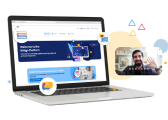Teaching for nine years, Javiera uses her educational background in pedagogy, specialization in ESL teaching, and courses on neuroscience and universal design to build confidence and autonomy in her students. She believes that learning a language opens new worlds, and loves to share her passion. Her instructional approach focuses on her students’ previous knowledge and interests, which provide context for instruction and authentic tasks and resources that will engage and inspire.
What is your nationality and where do you currently reside?
I was born and raised in Santiago, the capital city of Chile in South America. I usually spend three or four months a year in Villarrica in the south of Chile and the rest of the year in Santiago.
What is your professional and educational background?
I studied Pedagogy at Pontificia Universidad Católica de Chile in Santiago and specialized in ESL teaching. I have attended different courses and workshops on different education/teaching topics, like neuroscience and Universal Design for Learning. I have been teaching English for nine years in different bilingual schools in Chile and doing English private lessons to students of all ages.
Which Bridge certifications or micro-credentials have you completed?
I am currently taking Bridge’s Micro-credential Instilling Leadership and Confidence in Your Learners.
How long have you been teaching with BridgeEnglish?
I have been teaching with BridgeEnglish since May 2023.
What are some of your favorite teaching tools or techniques to engage students in the learning process?
One of my favorite teaching tools is to always start using my student’s previous knowledge and interests when giving examples or context for grammar and vocabulary. As well as, making them feel comfortable when making mistakes and acknowledge that they are a key part of the learning process.
Do you use any particular resources or tools to enhance your students’ learning experiences? If so, can you provide some examples?
I like to include different conversation topics, like environmental concerns and wellness that promote the use of vocabulary and grammar in other contexts and provide contemporary topics of conversation that motivate debate or generate different opinions. This keeps students engaged in the lesson and motivated to learn English.
How long have you been teaching languages and what inspired you to become a language teacher?
I have been a language teacher for nine years. Learning another language when growing up felt like opening a door to other worlds, realities, and cultures. This personal insight inspired me to teach. It’s such an amazing experience to read a book in the original language it was written in. It is a privilege to provide other people the chance to have that kind of experience.
What do you believe are the key skills and language areas that students should focus on when learning Business English?
I believe that the key skills are speaking and listening. From my experience, when students master these skills they feel confident and comfortable in a business meeting or when traveling abroad.
How do you incorporate your culture and background into your language lessons?
I mainly incorporate my culture and background in comparisons between cultures and for conversation topics. It’s a really interesting way to get to know my students because they love to share their experiences and culture.
What challenges do you often encounter when teaching Business English, and how do you overcome them?
Currently, I have had special inquiries from my students about how to improve their understanding of different English accents. In particular, I have been teaching students from the mining sector that need to grasp the Australian English accent. I have been doing some research and listening to different movies and podcasts from Australia to better grasp the accent and dialect, so I can develop activities that will help my students.


